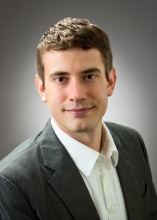BME Lecture Series: Matthew Paszek, Cornell University

Assistant Professor
Chemical and Biomolecular Engineering
Cornell University
Abstract: Tumor cells exploit basic physical principles to override biological constraints and acquire more lethal characteristics. This hallmark is particularly true at the cell surface where aggressive cancer cells deregulate their signaling systems and reshape their membrane into forms that promote dissemination. During the seminar, I will discuss simple entropic driving forces that sculpt the morphology of the cancer cell surface. Notably, complex sugar and protein co-polymers are assembled at high density on the cancer cell membrane to form a dense structure that is referred to as the glycocalyx. Remarkably, super-resolution optical techniques reveal that glycocalyx polymers obey classical Alexander – de Gennes scaling laws, which can be applied to predict tumor cell morphologies and the effects of biopolymer density, length and charge on membrane shapes. I also will discuss our new tools for editing the glycocalyx and how we can exert entropic control over receptor-mediated signaling. Finally, I will discuss new evidence that the surface tension of common biomedical silicone liquids and gels is a potent mechanical stimulant of cells. Notably, silicone lubricants that are often co-expelled with pharmaceutical formulations from current generation pre-filled syringes feel and behave like rigid foreign bodies to cells.
Bio: Matthew J Paszek is an assistant professor in the Robert Frederick Smith School of Chemical and Biomolecular Engineering at Cornell University. His research interests are in chemical biology, physical biology and bioengineering, with a particular interest in the functioning of glycans in multicellular life and disease biology. Toward this end, his lab develops optical technologies and experimental approaches that enable new lines of inquiry in glycoscience. Prior to Cornell, Paszek investigated the mechanobiology of cancer under the mentorship of Daniel Hammer and Valerie Weaver at the University of Pennsylvania, where he obtained his doctorate. Paszek expanded on his graduate studies as a postdoctoral fellow at UC San Francisco, during which time he developed new methods for nanoscale cellular imaging and identified a fundamental role for the glycocalyx in the physical organization and activation of cell-surface receptors in cancer.
Share
Upcoming Events
-
MAE 298 SEMINAR: Co-Designing Mutual Aid Transportation for Disaster Resilience
-
CBE 298 Seminar: Engineering Strategies for Structural Heart Disease
-
MSE 298 Seminar: Radiation Resistance and Mechanical Response of Ceramics in Extreme Environments
-
MAE 298 SEMINAR: Stretchable Electronics for Soft Biological and Robotic Systems
-
CBE Distinguished Lecture/CBE 298 Seminar: Computational Design of Peptides as Detectors, Sensors and Drugs
